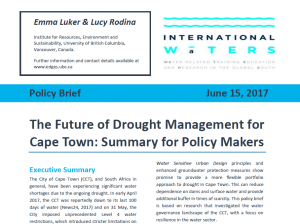Luker, E. & L. Rodina (2017) Policy brief: The Future of Drought Management for Cape Town- Summary for Policy Makers. The University of British Columbia, Institute for Resources, Environment and Sustainability.
The City of Cape Town (CCT), and South Africa in general, have been experiencing significant water shortages due to the ongoing drought. In early April 2017, the CCT was reportedly down to its last 100 days of water (News24, 2017) and on 31 May, the City imposed unprecedented Level 4 water restrictions, which introduced stricter limitations on residential water use, encouraging a limit of 100 l per person per day; forbidding irrigation with municipal water; and suggesting the use of treated effluent and wastewater for non-potable purposes. The indigent water allocation for impoverished households was capped at 350 l per day (CCT, 2017). Due to climate change effects, drought events are no longer within an envelope of predictable probability. In fact, South Africa is likely to experience more frequent droughts in the future. As this research suggests, existing institutional barriers to alternative water source integration may be limiting effective adaptation responses to hydrological variability and regime changes. Read more HERE
